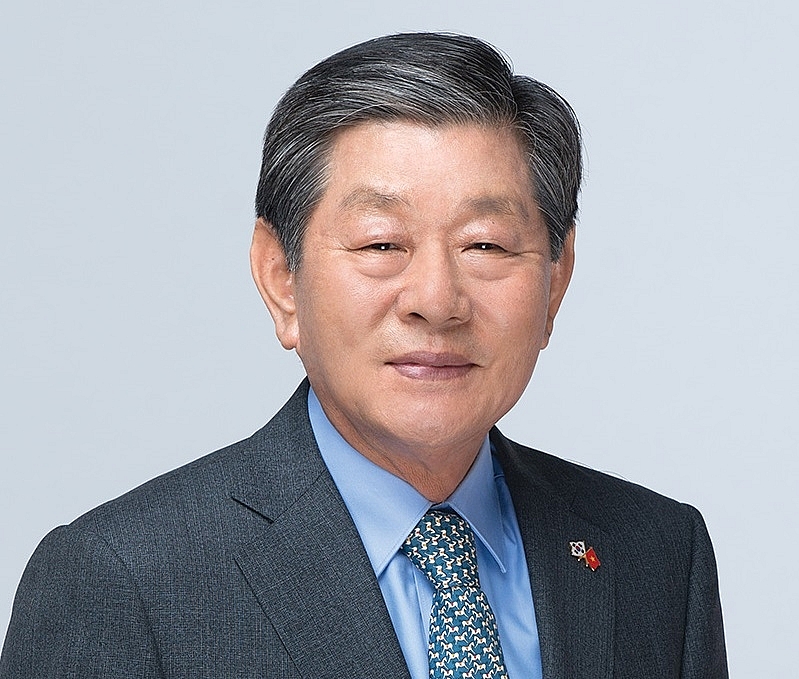Optimism for South Korean surge
 |
| Kim Heung Soo, chairman of the Korean Chamber of Commerce and Industry |
What are the prospects of capital inflows from South Korea to Vietnam this year?
South Korea has pumped $67.7 billion into Vietnam from 1988 until last year, making it top of the list of 135 countries and territories investing in Vietnam, at 18.7 per cent of total foreign investment. Vietnam has continued its economic growth in recent years, and after achieving a GDP growth rate of 7.08 per cent in 2018, it continuously achieved a growth rate of 7.02 per cent in 2019, exceeding the initial target of the government. It is also attracting much attention as a promising foreign direct investment (FDI) destination from investors around the world.
The rapid development and growth of Vietnam’s economy is expected to recover after the second half of the year when the coronavirus crisis is hopefully resolved here, and South Korean companies’ investment is also expected to recover gradually.
Previously that investment in Vietnam was traditionally concentrated on the manufacturing industry such as garments, bags, and footwear. However, recently South Korean investment in Vietnam has also diversified into high value-added high-tech industries such as electronics, IT, automobiles, construction equipment and parts, distribution, and the service sectors. And this trend is expected to be continued in 2020.
How does the COVID-19 outbreak affect the investment and merger and acquisition (M&A) activities among South Korean investors in Vietnam?
As Vietnam’s domestic market has grown steadily over the past few years, investors have been interested in equity funding and acquisition of Vietnamese companies through M&A activities to acquire distribution networks as well as existing networks of Vietnamese companies. For example, Hanwha Group invested $400 million in Vingroup JSC in August 2018, while SK Group signed a $1 billion equity investment contract with Vingroup JSC. We believe that South Korean companies are actively investing in Vietnamese companies in more various fields through M&A activities, such as the food delivery group Woowa Brothers Corporation taking over Vietnammm in 2019.
In particular, through M&A activities, South Korean companies would like to consider investing in Vietnamese companies to enter into the specific market where it is difficult to acquire new licenses such as finance and energy.
However, as the recent outbreak of global COVID-19 shows, many economists expect that global economic development and investment in this year would lead to a slowdown overall. We are also concerned that many Korean companies and investors will hesitate to pour money in and carry out M&A activities abroad, including in Vietnam.
In light of that issue, and the trend of the China Plus One strategy, do you expect a surge in manufacturing relocation among South Korean companies from China to Vietnam?
Recently, many foreign investors have cited Vietnam as an alternative to China, or as part of China Plus One, and South Korean investors are also looking to relocate their manufacturing facilities in China and even in South Korea to Southeast Asian countries including Vietnam.
At the same time, they are also considering many other locations such as India, Eastern Europe, or Africa. In particular, after the coronavirus outbreak, the opacity of China’s economic system and various social problems were raised. As a result, groups such as Google and Microsoft are considering moving their manufacturing facilities from China to other countries such as Vietnam.
However, as investments into Vietnam from various countries and companies have been increasing recently, many foreign-invested companies are currently struggling with rising labour costs due to shortages and also are suffering from higher factory site costs. Therefore, the attractiveness of investing in Vietnam is decreasing gradually.
So what can make Vietnam an ideal investment destination for South Koreans?
It is necessary that the government should have willingness to reform and improve the investment environment in Vietnam continuously. In particular, the unnecessary costs due to administrative processing should be reduced through increasing transparency in administrative procedures
It should also refrain from a sharp rise in wages compared to other countries nearby, such as China and other Southeast Asia countries. Due to the sharp rise in real estate prices recently, it is also urgent to prepare measures for the increase in initial investment costs, such as an increase in the cost of entering the industrial complex for factories.
In addition, the government should make efforts continuously to suppress the rising consumer price index and stabilise the macro-economy.
Finally, it must accelerate the equitisation of state-owned enterprises and promote research and development investment and a long-term technical manpower programme.
What the stars mean:
★ Poor ★ ★ Promising ★★★ Good ★★★★ Very good ★★★★★ Exceptional
Related Contents
Latest News
More News
- Hermes joins Long Thanh cargo terminal development (February 04, 2026 | 15:59)
- SCG enhances production and distribution in Vietnam (February 04, 2026 | 08:00)
- UNIVACCO strengthens Asia expansion with Vietnam facility (February 03, 2026 | 08:00)
- Cai Mep Ha Port project wins approval with $1.95bn investment (February 02, 2026 | 16:17)
- Repositioning Vietnam in Asia’s manufacturing race (February 02, 2026 | 16:00)
- Manufacturing growth remains solid in early 2026 (February 02, 2026 | 15:28)
- Navigating venture capital trends across the continent (February 02, 2026 | 14:00)
- Motivations to achieve high growth (February 02, 2026 | 11:00)
- Capacity and regulations among British areas of expertise in IFCs (February 02, 2026 | 09:09)
- Transition underway in German investment across Vietnam (February 02, 2026 | 08:00)

 Tag:
Tag:




















 Mobile Version
Mobile Version